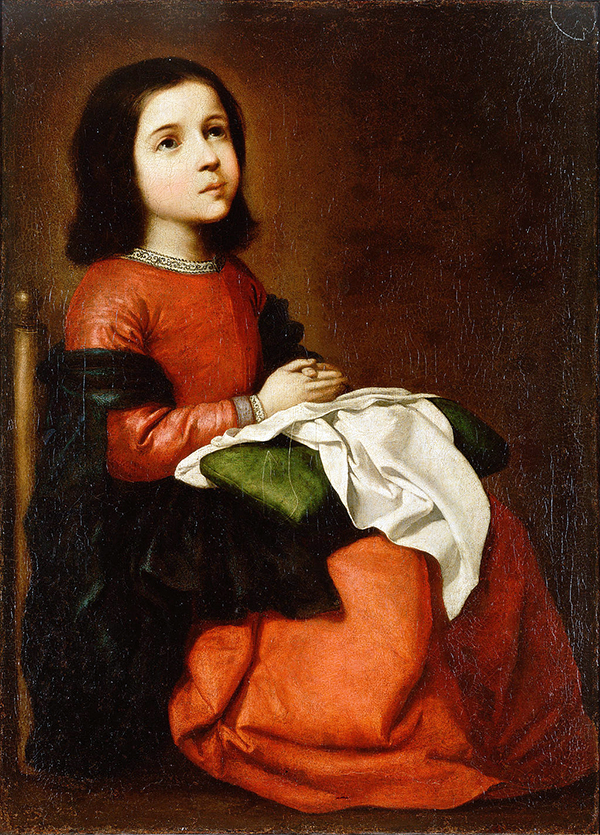"Whatever you ask in my name, I will do"
- RONDA CHERVIN
Christ tells us to ask him for all things.
Join the worldwide Magnificat family by subscribing now: Your prayer life will never be the same!
 Childhood of the Virgin by Francisco de Zurbarán, Public domain, via Wikimedia Commons.
Childhood of the Virgin by Francisco de Zurbarán, Public domain, via Wikimedia Commons.
It appears that he wants to give us gifts at our request instead of anonymously. As in human love, it spoils a gift somewhat if we don't know where it comes from, since part of the pleasure is the knowledge that this person's love is behind it. But sometimes we do not get what we pray for, and this greatly bewilders us—even causing anguish when the request seems desperate and necessary. This is hard to understand without a total trust in him and a firm conviction of his love, which helps us grasp the fact that there must be some reason why he did not grant us the wish we are so sure is important. A child may implore his mother not to let the doctor give him that painful, frightening injection, but the mother would not be truly loving if she gave into his pleas.
Many times one goes to a friend for advice and comes away feeling consoled even though no solution to the problem has been found. The reason is that the loving attention the friend has given is worth more than any concrete answer would be. I think that this is what happens very often when we come to God in prayer. ...
Perhaps the greatest result of prayer is that by constantly bringing all one's thoughts to God, one makes it possible for him to help situate these thoughts in the context of the vocation of love. If the man who prays is willing to openly tell God all that he feels, then he will soon discover what in his life is good and what is evil. Brought before God, the foolish, mediocre, or harmful thoughts may be more readily rejected and the good ones may receive the strength of God's affirmation. ... Have you ever found, as I have, that when your thoughts or feelings are evil you hide from God so as to cherish them in privacy; whereas the moment you turn back (convert) to him, the same thoughts become occasions of deep regret and you desire to strive for patience, kindness, and love to replace them?
 I hope you appreciated this piece. Before you move on, please consider taking the step of supporting CERC's mission with just $3.
I hope you appreciated this piece. Before you move on, please consider taking the step of supporting CERC's mission with just $3.
When you Google the answer to a question about faith and morals or current events in the Church, you often have to wade through dozens of misleading secular articles before finding a reliable source. CERC will give you faithful, reliable, well-reasoned answers to your questions—with just one click.
CERC is entirely reader supported. Around the world, readers can access CERC's free resources because of people like you. You give us the ability to provide the truth unfettered by algorithm censorship and secular-favored rankings.
Please consider supporting us just once with $3, or better yet, become a Guardian of Truth and support us every month with a little more. Thank you.
J. Fraser Field
Founder of CERC

Acknowledgement
 Ronda Chervin. "The Living Tabernacle of the Lord," from Church of Love. Liguori Publications (1973).
Ronda Chervin. "The Living Tabernacle of the Lord," from Church of Love. Liguori Publications (1973).
Printed in the April 2024 edition of Magnificat. Used with permission.
Join the worldwide Magnificat family by subscribing now: Your prayer life will never be the same!
The Author

 Ronda Chervin is a convert from Judaism, professor of philosophy and theology, and author of over fifty books including Healing of Rejection with the Help of the Lord: A Survivor's Guide, Avoiding Bitterness in Suffering: How Our Heroes in Faith Found Peace Amid Sorrow, Catholic Realism: A Framework for the Refutation of Atheism and the Evangelization of Atheists, What The Saints Said About Heaven: 101 Holy Insights On Everlasting Life, and Holding Hands with God: Catholic Women Share Their Stories of Courage.
Ronda Chervin is a convert from Judaism, professor of philosophy and theology, and author of over fifty books including Healing of Rejection with the Help of the Lord: A Survivor's Guide, Avoiding Bitterness in Suffering: How Our Heroes in Faith Found Peace Amid Sorrow, Catholic Realism: A Framework for the Refutation of Atheism and the Evangelization of Atheists, What The Saints Said About Heaven: 101 Holy Insights On Everlasting Life, and Holding Hands with God: Catholic Women Share Their Stories of Courage.


